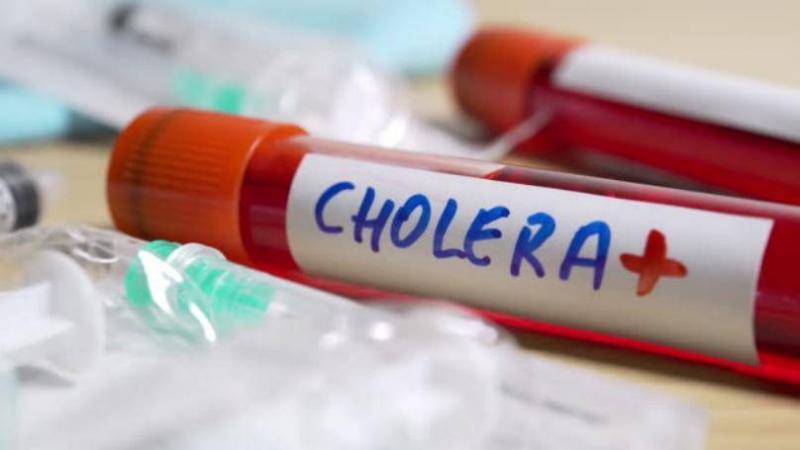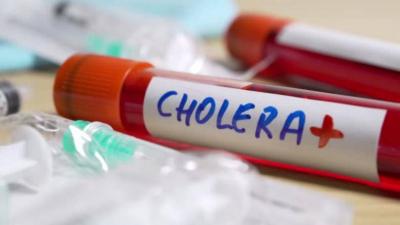The Minister of Public Health in the caretaker government, Firas Al-Abyad, presented the results of the cholera vaccination campaign a week after its launch during a press conference held at the ministry. Al-Abyad began the conference by noting, "The cholera outbreak continues in Lebanon, but the cases in hospitals are under control, as necessary treatment is being provided, alongside a decrease in the number of cases requiring hospitalization, as indicated by the daily report issued by the Ministry of Public Health, which recorded about 55 cases, including a few that require intensive care."
He pointed out that "the cumulative number reached nearly four thousand cases up until yesterday, including 600 confirmed cases, with the registration of one death of an elderly person who suffered from multiple illnesses that hindered his full response to treatment."
Regarding the vaccination campaign, he mentioned that it is "taking place in coordination with international partners from the World Health Organization, UNICEF, the United Nations High Commissioner for Refugees, and other United Nations-affiliated organizations, in addition to local partners and international institutions that are deploying their field teams on the ground, such as the Lebanese Red Cross, the 'Aamal Foundation,' Medair, and Doctors Without Borders, as well as the International Committee of the Red Cross."
He described the work being carried out as "huge, as field teams are simultaneously deployed in four governorates across more than six districts to cover over 53 towns, reaching more than 45,000 homes."
He presented the results achieved so far over six days as follows:
- About 190,000 vaccine doses have been administered, exceeding the target number planned for this period in the national vaccination strategy.
- The Lebanese Red Cross, the 'Aamal Foundation,' Medair, and Doctors Without Borders have deployed 250 field teams, consisting of 945 health and administrative workers who move from house to house and from town to town, providing coverage for 82 educational institutions and four prisons, with plans to soon extend to nursing homes and densely populated areas.
- In terms of the distribution of vaccinated individuals by nationality: half are Lebanese, and the other half are of different nationalities, primarily Syrians, followed by Palestinians and other nationalities. The distribution of vaccinated individuals by gender is as follows: 53% are female and 47% are male, with most of these individuals aged between 5 and 14 years. They are being registered on the MERA platform of the Ministry of Public Health, which is the result of cooperation between UNICEF, the Primary Health Care Program, and the Electronic Health Program of the ministry. This platform, typically used in routine immunization programs, has shown excellent results in the vaccination campaign.
- The cholera vaccination campaign will continue in the coming weeks to distribute the total of 600,000 doses.
- The Ministry of Public Health, in coordination with the World Health Organization, submitted a request at the beginning of the week to receive a second batch of approximately one and a half million doses to commence the second phase of the vaccination campaign, aimed at increasing community protection and preparing for a safe holiday season.
On the uptake of the vaccine, Al-Abyad reiterated his satisfaction, highlighting the "preparatory and ongoing efforts for the vaccination campaign," confirming that "the cholera vaccine is safe, with over one hundred million users worldwide according to the World Health Organization, with rare side effects when they occur."
He noted that "the Ministry of Public Health, through its Pharmacovigilance system, is monitoring any possible side effects, and so far, these side effects have remained very rare," pointing out that "in some areas, parents and residents justify their reluctance to receive the vaccine by stating that they have access to clean water."
He emphasized that "while the cholera outbreak is under control, it spreads rapidly and is highly contagious, and a scenario similar to the one witnessed in Akkar could repeat itself with a significant number of cases being registered. Therefore, it is very important to get vaccinated even in areas considered safe, especially since movement between areas is a factor that can lead to contracting the infection."
Finally, he thanked "the support provided by international and local partners and the team at the Ministry of Public Health for their efforts in implementing a successful vaccination campaign," hoping that the "holiday season will be safe for everyone."




